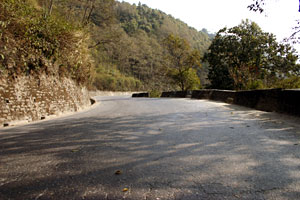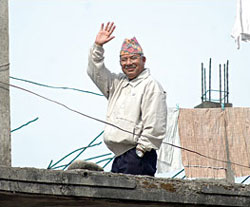

BLOCKED ARTERY: The Tribhuban Highway near Nagdhunga on Wednesday morning wears a deserted look as the Maoist blockade of the capital enters its second day. On a normal day, 3,000 vehciles pass through this point, on Tuesday only 70 vehicles moved. A few convoys escorted by the army are expected to ply Wednesday. (PICS: KUMAR SHRESTHA)
|
|
| STOOD UP: The UML's Madhab Nepal waves at journalists from house arrest on Thursday afternoon. The government refused to allow him to meet visiting US Principal Deputy Secretary of State for South Asian Affairs Donald Camp. |
Feedback from political figures and visitors who have met the king this week indicate he is weary of the political stalemate and is seeking a way out. Sources told us the king may be having second thoughts about plans to declare polls in his new year speech on 14 April after being convinced it would be needlessly confrontationist.
A compromise face-saving formula for both the parties and king may be an agreement on an interim government made up of the leaders of the seven parties. The parties could accept this if the king declared that sovereignty rests with the people. Insiders say the palace and the parties are now under intense pressure from diplomats to meet halfway.
These hints of conciliation come amidst the visit of US Principal Deputy Assistant Secretary of State for South Asian Affairs Donald Camp who met the king in Pokhara on Wednesday. Camp was refused permission to meet UML leader Madhab Nepal on Thursday but he told a press conference: "We are hopeful that there will be a return to democracy in Nepal."
Till now the king had successfully portrayed himself as a bulwark against the Maoists to garner support from hawks in the American and Indian establishments. China has also sent strong signals with the rescheduled visit to Kathmandu by State Councillor Tang Jiaxuan this month during which he reportedly wants to meet opposition leaders. But even they appear to have realised an interventionist monarchy is detrimental to stability. The aid cuts and arms embargo imposed after 1 February were beginning to bite, and that could have tipped the balance.
An indication that the parties may be willing to give the king wriggle room is that they have not announced any major stir till mid-April. Three months after their 12-point agreement, the parties and the rebels are meeting again this week in New Delhi to reaffirm commitment to their fragile pact. The parties want the Maoists to withdraw their blockade and strike calls as well as stop using socket bombs which have killed and maimed many children (see p 8-9). The rebels, on the other hand, feel the parties are getting cold feet. Party sources say they will try to convince the Maoists to return to a ceasefire and thus remove the rationale for the palace's militarisation and crackdown on democracy.
The parties had so far insisted on restoration of parliament or a roll back to October 2002 but look likely to accept an all-party interim setup to negotiate with the Maoists and take the country to elections under a monarchy that returns to its constitutional role.



